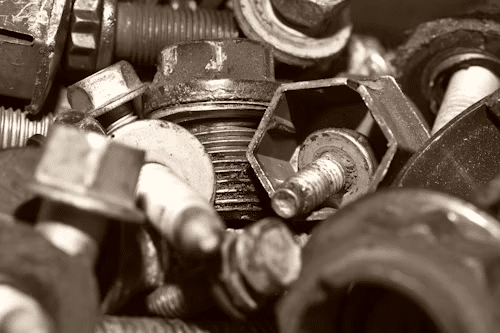If you’re looking to fasten something to concrete, you’ll need the right kind of bolt. Concrete bolts are designed to provide a strong, secure hold in concrete, making them ideal for a variety of applications. From attaching metal plates to concrete walls to securing electrical conduits to concrete floors, concrete bolts are a versatile and reliable choice.
Our team of experts is always available to provide advice and best use-cases, but it’s important to remember to check with local building codes and engineers for correct usage instructions. With Fastening Specialists, you can trust that you’re getting the best in product value, insight, and code expertise. Let us help you find the right concrete bolts for your project today.
Understanding Concrete Bolts and Fasteners
When it comes to securing non-structural components to a concrete surface, concrete bolts and fasteners are the go-to solution. These fasteners provide additional strength to the concrete and transfer the force of the dynamic or static load to a broader area, reducing the risk of failure. In this section, we’ll explore the different types of concrete anchors, materials and strength ratings, and how to select the right drill bit.
Types of Concrete Anchors
There are several types of concrete anchors available, including wedge anchors, sleeve anchors, and concrete screws. Wedge anchors are designed to be used in solid concrete and are perfect for heavy-duty applications. Sleeve anchors, on the other hand, are ideal for use in softer materials like brick or block. Concrete screws are the easiest to install and can be used in a variety of materials.
Materials and Strength Ratings
Concrete anchors are made from a variety of materials including stainless steel, zinc-plated steel, and carbon steel. The strength rating of a concrete anchor is determined by its diameter and length. It’s important to choose the right strength rating for your application to ensure that the anchor can withstand the load it will be subjected to.
Selecting the Right Drill Bit
Selecting the right drill bit is crucial to ensure that the anchor is installed correctly. The drill bit should match the size of the anchor being used. It’s also important to choose a bit that is suitable for the material you’ll be drilling into. For example, a masonry bit is best for drilling into concrete.
Installation Techniques
When it comes to installing bolts in concrete, there are several techniques you can use to ensure a secure and stable fixture. Here are some of the most effective methods for installing concrete anchors.
Drilling and Preparing Holes
Before you can install a concrete anchor, you need to drill a hole in the concrete. For solid concrete, use a hammer drill, and for block, use a regular drill. When drilling, make sure to use the appropriate masonry bit for the size of the anchor you will be using. After drilling, clean the hole thoroughly with a vacuum cleaner to remove any debris or dust. This step is crucial for proper anchor insertion.
Setting Anchors in Concrete
Once you have drilled and cleaned the hole, it’s time to insert the concrete anchor. Gently drop the metal anchor into the hole, ensuring it is inserted plumb. Use a wrench to tighten the anchor bolt, making sure it is snug against the concrete and doesn’t wiggle.
Attaching Fixtures to Concrete
After setting the anchor, you can attach your fixture to the concrete. Use the appropriate hardware for your project, such as screws or bolts. Make sure to use a pilot hole when attaching fixtures to concrete, unless the screw can go in without one.
Applications and Load Considerations
When selecting concrete anchors for your project, it’s important to consider the applications and load requirements. Here are some factors to keep in mind:
Light-Duty vs. Heavy-Duty Applications
Light-duty applications include attaching furring strips, electrical boxes, and conduit to concrete. For these applications, plastic anchors or sleeve anchors are suitable. Heavy-duty applications, on the other hand, require wedge anchors or drop-in anchors. These anchors are designed to handle heavier loads and provide a more secure hold.
Weight and Stress Factors
The weight of the object being attached and the stress factors involved are also important considerations. For lighter loads, such as hanging pictures or curtains, plastic anchors or toggle bolts may be sufficient. For heavier loads, such as machinery or equipment, wedge anchors or drop-in anchors are recommended.
Safety and Precautions
When working with concrete anchors and bolts, it’s important to take the necessary safety precautions to avoid injury. Here are some key safety tips to follow:
Proper Use of Tools
Using the right tools for the job is crucial for safety and efficiency. When drilling holes for concrete anchors, use a hammer drill with a carbide-tipped bit. This will help you drill through the tough concrete material with ease. Make sure the drill is set to the correct speed and torque for the job at hand.
Personal Protective Equipment
Wearing the proper personal protective equipment (PPE) is essential when working with concrete anchors and bolts. Safety glasses or goggles are necessary to protect your eyes from flying debris or dust. Gloves can help protect your hands from sharp edges or rough surfaces. Ear protection is also recommended when using power tools.
Specialized Concrete Anchors
When it comes to securing items to concrete and brick, standard anchors may not be sufficient. That’s where specialized concrete anchors come into play. These anchors are designed to provide a secure hold in specific materials, such as limestone, and in specific applications, such as conduit clamps.
Anchors for Specific Materials
Different materials require different types of anchors. For example, drop-in anchors are ideal for concrete, while lag shields work best with brick. Plastic wall plugs are a good option for light-duty anchors, while toggle bolts are ideal for heavier items like metal railing and grab bars. Ribbed plastic anchors are also a popular choice for light to medium-duty applications.
Features of Advanced Anchors
Advanced anchors, such as concrete bolts and concrete fasteners, offer more features than standard anchors. Diamond-cut notches and slits help to increase holding power, while deeper threads and better coatings help to improve durability. For building projects that require a high level of precision, pre-drilled holes can be used to ensure that the anchors are placed exactly where they need to be.
The team at Fastening Specialists provides advice and best use-cases, but always check with local building codes and engineers for correct usage instructions.

